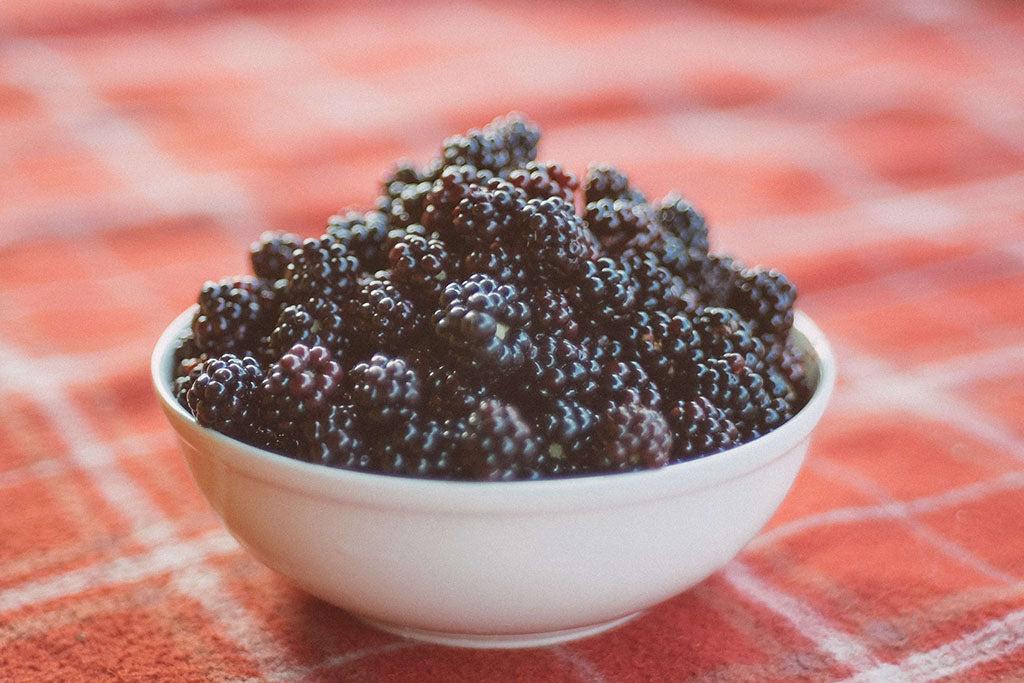Summary: “Can I give my dog blackberries?” Well, pet owner, in this blog, we’ll learn just that. Firstly, we’ll discover whether blackberries are safe for dogs and then if they’re good for dogs to consume too… Blackberries are of the Rubus species of berries and are closely related to raspberries. They are popular with humans […]
Can Dogs Eat Blackberries?

Summary: “Can I give my dog blackberries?” Well, pet owner, in this blog, we’ll learn just that. Firstly, we’ll discover whether blackberries are safe for dogs and then if they’re good for dogs to consume too…
Blackberries are of the Rubus species of berries and are closely related to raspberries. They are popular with humans because they are rich in antioxidants, fiber, manganese, water, vitamins K, C, and A, Omega-3 fatty acids, and even trace minerals like potassium and calcium.
They’re additionally low in calories and for a piece of fruit, considered low in sugar too.
Can Dogs Have Blackberries?
Yes, your dog can enjoy blackberries! As long as they’re fresh and rinsed of any potential pesticide residue, your dog can enjoy blackberries in moderation with you. But, as with any food that’s high in fiber – too much can cause a loose stomach or excessive gas and in some cases, vomiting so be mindful of this.
Because of their low sugar, fat, and calorie content, blackberries are considered relatively safe to offer to obese or overweight dogs too, or dogs with conditions like diabetes – but it’s always advised to consult with your vet in these cases before you offer a diabetic pooch blackberries.
Blackberries also contain a very, very small amount of xylitol, which is actually a sweetener used in many human food products that is considered toxic to dogs. However, your dog would have to really gorge on blackberries for this to cause them a significant health issue. If your dog has eaten a sizeable amount of blackberries, is sick or experiencing diarrhea, and doesn’t seem like themselves, do consult with your vet urgently.
If you’re picking blackberries yourself (blackberries bloom between April and May, and are good to pick between June and August), make sure you’re 100% confident in what you’re picking and sharing with your dog. Many wild berries can be poisonous to dogs. These include mistletoe, baneberries, pokeberries, juniper, and holly berries. Get your dog to a vet as soon as possible if you suspect they’ve eaten any of these berry types.
However, hybrid versions of blackberries are safe like the loganberry. It’s best not to let your dog eat berries in the wild at all though and ethically train them to only accept or eat food offered by you, their master.
A blackberry can pose a choking hazard to your dog too, particularly if they gulp their food down or are a very small or teacup breed. Make sure you chop the berries up to reduce this risk.

Are Blackberries Good For Dogs?
Dogs usually love berries and they’re packed with nutrients that will only benefit your dog’s health! But, it’s always best to offer berries like this as a treat for good behavior, or as a sprinkling on top of their food to boost their fiber levels rather than offering them bowls of blackberries – the fiber may be too intense on their tummies otherwise. Other berries your dog can enjoy are blueberries, raspberries, cranberries, and strawberries.
However, this does not then mean they can enjoy jam versions of these fruits too, or be offered slices of sweet berry pies; the other ingredients present in these items could pose a toxicity threat to your dog.
Always take it slowly when introducing any new food to your dog to avoid upsetting their stomach – particularly with puppies. Feed a very small amount of blackberries per day before considering continuing to feed low quantities of blackberries to your dog – we’d advise no more than 1 cup of blackberries per day. As with humans, all dogs will react differently to different foods so always be mindful of this when trying them on new foods, snacks, and treats regardless of whether they’re deemed safe.
There are some foods you should absolutely avoid feeding to your dog, including fruits like cherries, the pit of apricots, and the seeds of apples. Find an extensive list below of food known to be toxic to dogs which you should make sure they avoid:

Sources
Author Guthrie, Lynn “Can Dogs Eat Blackberries? Yes, These Tasty Berries Have Many Health Benefits” Prrs & Wags by Pumpkin, Aug. 18 2021 https://www.pumpkin.care/blog/can-dogs-eat-blackberries/
Author Kucera, Tabitha “Can Dogs Eat Blackberries?” The Spruce Pets, Dec. 28. 2020 https://www.thesprucepets.com/can-dogs-eat-blackberries-5093738
 S
S



